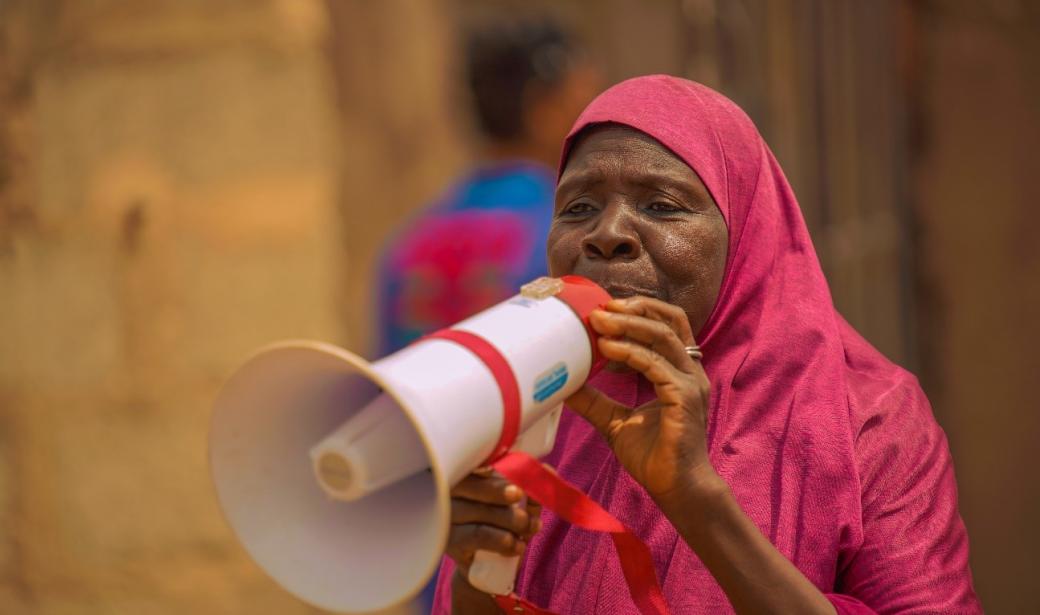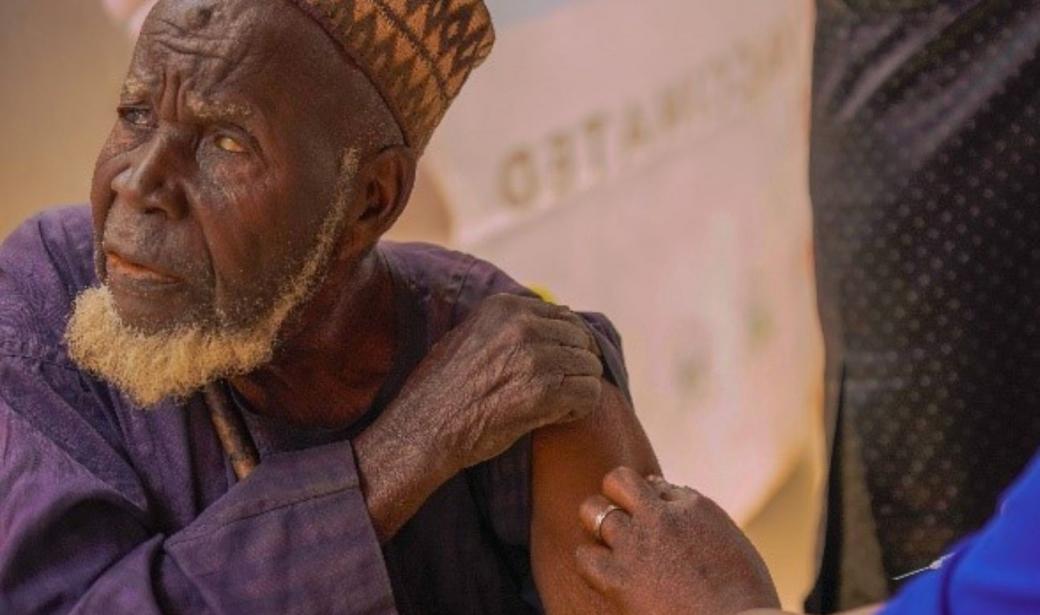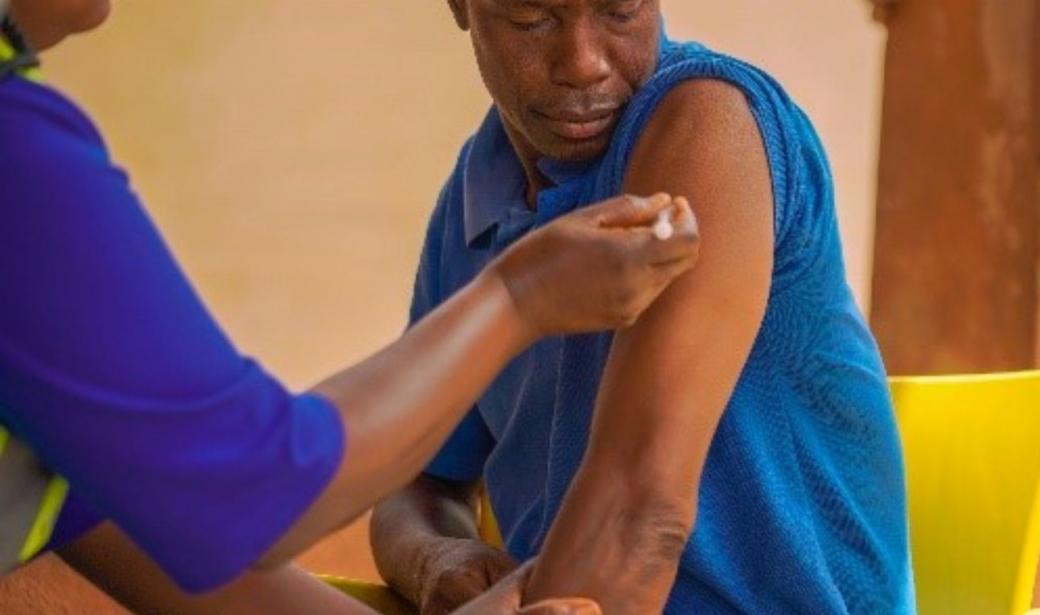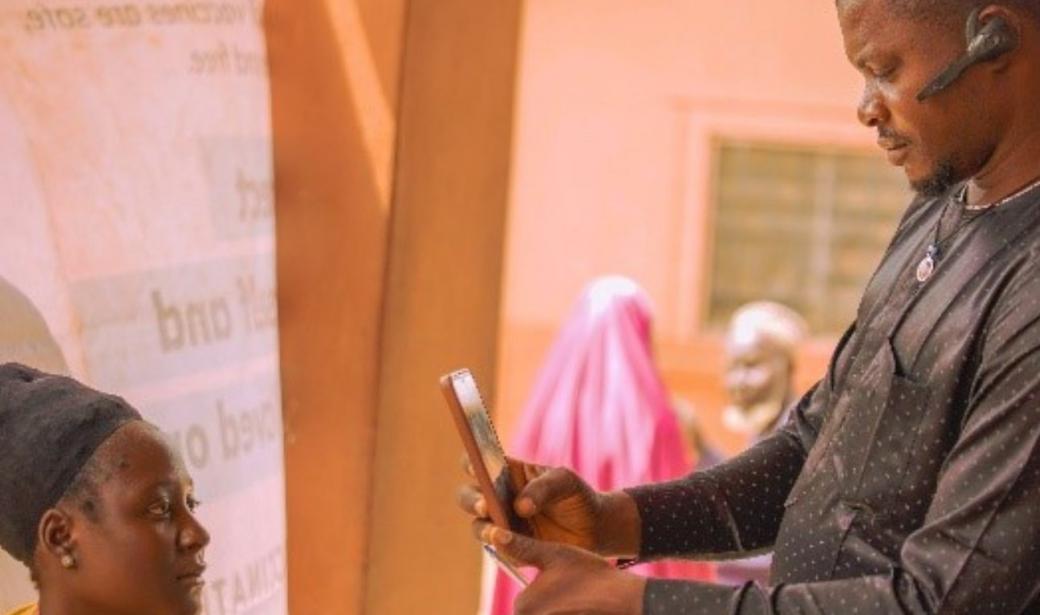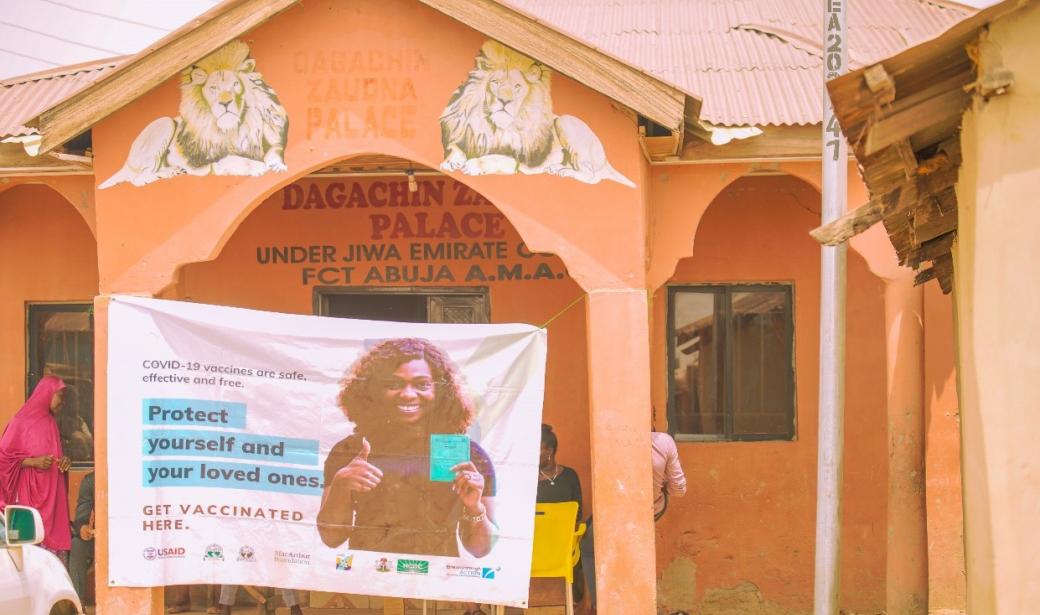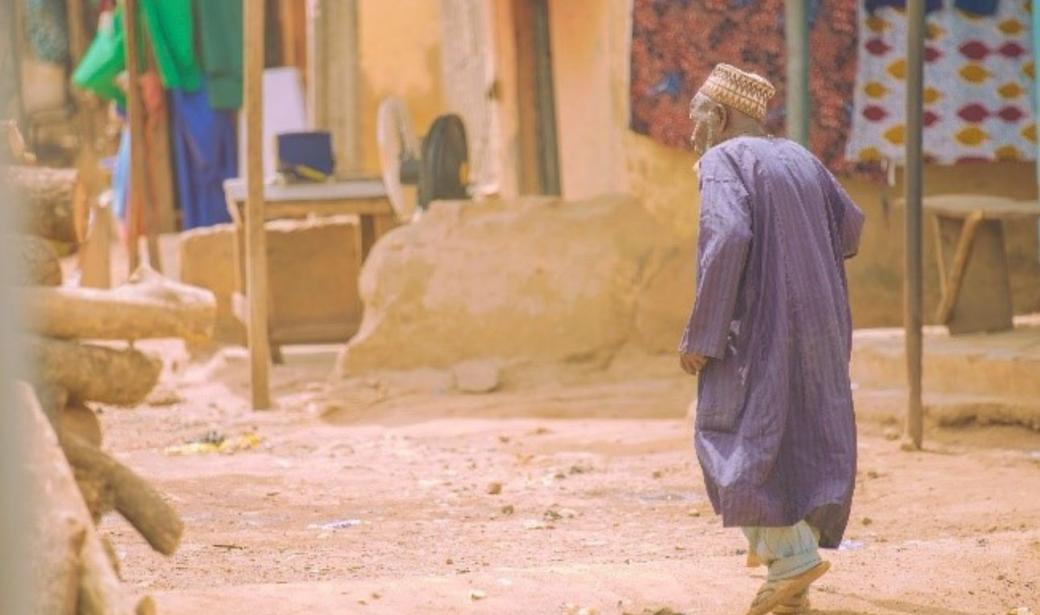Abuja - On 05 March 2021, Nigeria rolled out the COVID-19 vaccination campaign to curb transmission of the coronavirus disease in the country.
Since then, the government and its partners, including the World Health Organization (WHO), are making deliberate efforts to ensure people in rural, and semi-urban communities across the 36 States and the Federal Capital Territory (FCT), are not left out of the vaccination drive.
Salamatu Rabo, mobilizing the community for COVID-19 vaccination
WHO/Ogbeide Eromosel
Nigeria recorded its first case of COVID-19 on 27 February 2020, and from then to 26 February 2023, Nigeria has recorded 266,313 confirmed cases with 3,155 deaths.
Despite Abuja, being one the epicentres of COVID-19 in the country, less than 50% (45%) of its population are fully vaccinated while 56% of its population have taken at least 1 dose.
Adopting various strategies such as community outreaches and SCALES (Service delivery, Communication, Accountability, Logistics, Electronic management of immunization data and supportive supervision) interventions, the government is ramping up the COVID-19 vaccine uptake in the country.
Despite Abuja, being one the epicentres of COVID-19 in the country, less than 50% (45%) of its population are fully vaccinated while 56% of its population have taken at least 1 dose.
Adopting various strategies such as community outreaches and SCALES (Service delivery, Communication, Accountability, Logistics, Electronic management of immunization data and supportive supervision) interventions, the government is ramping up the COVID-19 vaccine uptake in the country.
Bature Abdullahi (74) receiving his first COVID-19 shot
WHO/Ogbeide Eromosele
In Zaudna, a community located in Abuja Municipal Area Council, FCT, the COVID-19 vaccination drive signifies that more old, vulnerable adults like 74 years old Bature Abdullahi are protected against the virus.
Pa Bature Abdullahi says he heard about COVID-19 and the vaccine but has not received the shot.
“I am glad they brought the vaccine here. The health worker scheduled me for the next dose and advise I show the COVID-19 card to my children so that they can take me to the health facility to complete the shots”
And for Jumai E David, who is a health worker leading the Palace COVID-19 team in Zanda, says getting the vulnerable vaccinated means all eligible populations will be covered by the drive as intended by the government and its partners
Pa Bature Abdullahi says he heard about COVID-19 and the vaccine but has not received the shot.
“I am glad they brought the vaccine here. The health worker scheduled me for the next dose and advise I show the COVID-19 card to my children so that they can take me to the health facility to complete the shots”
And for Jumai E David, who is a health worker leading the Palace COVID-19 team in Zanda, says getting the vulnerable vaccinated means all eligible populations will be covered by the drive as intended by the government and its partners
Usman Idris, receiving his booster dose
WHO/Ogbeide Eromosele
Taking the COVID-19 vaccination campaign to the community allows people yet to receive any dose to receive it and those yet to complete theirs to do so.
In the case of Usman Idris, he received his first and second doses at a vaccination post outside Abuja.
“I kept postponing getting the booster dose, but now that they are in my area, I have no excuse,” he says.
Mr Idris has completed his primary series and now has received a booster shot. He says his action is to protect his family and friends from contracting COVID-19.
In the case of Usman Idris, he received his first and second doses at a vaccination post outside Abuja.
“I kept postponing getting the booster dose, but now that they are in my area, I have no excuse,” he says.
Mr Idris has completed his primary series and now has received a booster shot. He says his action is to protect his family and friends from contracting COVID-19.
Elom Ugochukwu captures Mathew Florence's data after receiving the COVID-19 vaccine
WHO/Ogbeide Eromosele
Florence Mattew, who is 29 and a new mother with a 2-month-old baby, was one person who received the first shot of the vaccine.
For Florence, receiving the COVID-19 vaccine within her community came as a massive relief.
“I got the COVID-19 vaccine in front of the palace without any stress. The health workers at the health facility where I go for ante-natal services have been advising us (pregnant women) that it is safe.
But I decided to wait until after I gave birth and decided to get the vaccine when I saw the vaccinators here,” she says.
On the ground with the vaccination team are health recorders like Elom Ugochukwu, who help register the people who receive the COVID-19 shot online for National COVID-19 data collection and validation.
For Florence, receiving the COVID-19 vaccine within her community came as a massive relief.
“I got the COVID-19 vaccine in front of the palace without any stress. The health workers at the health facility where I go for ante-natal services have been advising us (pregnant women) that it is safe.
But I decided to wait until after I gave birth and decided to get the vaccine when I saw the vaccinators here,” she says.
On the ground with the vaccination team are health recorders like Elom Ugochukwu, who help register the people who receive the COVID-19 shot online for National COVID-19 data collection and validation.
The vaccinators and residents at the vaccination post in front of the palace of the District Head of Zanda, Abuja.
WHO/Ogbeide Eromosele
Like other community leaders in Nigeria, the District Head of Zaudna, Abuja Mohammed T Sarki, is working with the health authorities to help alleviate reluctance to receive the COVID-19 vaccine among the population in his locality.
In his palace located in the middle of the village, the community leader volunteered his courtyard as a COVID-19 vaccination post.
“I have received three doses of the COVID-19 vaccine. I agreed with the health workers to mount a COVID-19 post at the palace as a sign of support for the campaign”, he says.
In his palace located in the middle of the village, the community leader volunteered his courtyard as a COVID-19 vaccination post.
“I have received three doses of the COVID-19 vaccine. I agreed with the health workers to mount a COVID-19 post at the palace as a sign of support for the campaign”, he says.
Pa Bature leaves for his home after receiving the COVID-19 vaccine
WHO/Ogbeide Eromosele
“COVID-19 remains a Public Health Emergency of International concern. To continue mitigating the risk of COVID-19, we must recognize the great need to sustain COVID-19 vaccination response efforts in addition to the urgency of recovering essential healthcare services (including routine immunization) and maintaining primary healthcare in Nigeria,” says the WHO Country Representative, Dr Walter Kazadi Mulombo.
To achieve herd immunity against COVID-19, Nigeria is aiming at 70% (in line with the WHO global target) of the total eligible population receiving the primary series of vaccination by March 2023, with a renewed focus on priority populations and vulnerable groups.
As of 08 March 2023, a total of 64,419,947 (60%) of the eligible population (18 years and above) are fully vaccinated forming 27% of the total population while 80,661,481 (70%) of the eligible population have been vaccinated with at least 1 dose forming (34%) of the total population, with (14%) of fully vaccinated persons have so far received booster dose.
Technical Contacts:
Dr Okamura, Mie; Email: okamuram@who.int
Dr Koko Ipuragboma Richard; Email: kokor@who.int
To achieve herd immunity against COVID-19, Nigeria is aiming at 70% (in line with the WHO global target) of the total eligible population receiving the primary series of vaccination by March 2023, with a renewed focus on priority populations and vulnerable groups.
As of 08 March 2023, a total of 64,419,947 (60%) of the eligible population (18 years and above) are fully vaccinated forming 27% of the total population while 80,661,481 (70%) of the eligible population have been vaccinated with at least 1 dose forming (34%) of the total population, with (14%) of fully vaccinated persons have so far received booster dose.
Technical Contacts:
Dr Okamura, Mie; Email: okamuram@who.int
Dr Koko Ipuragboma Richard; Email: kokor@who.int
For Additional Information or to Request Interviews, Please contact:
Hammanyero, Kulchumi Isa
Communications Officer
WHO Nigeria
Email: hammanyerok [at] who.int (hammanyerok[at]who[dot]int)



